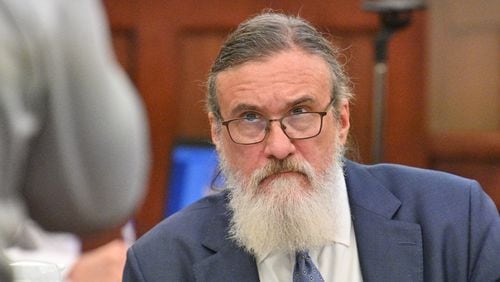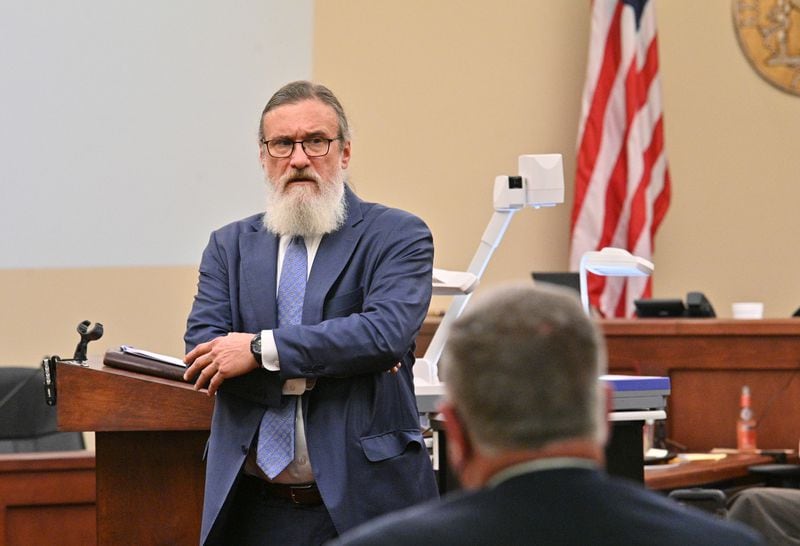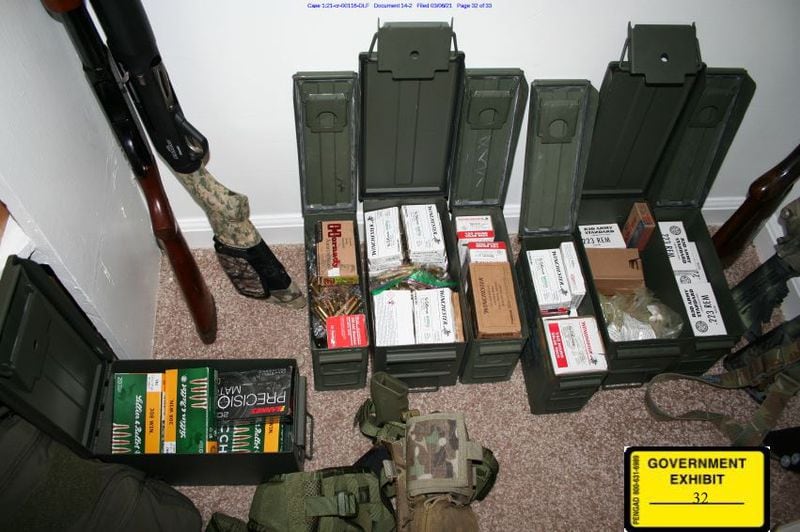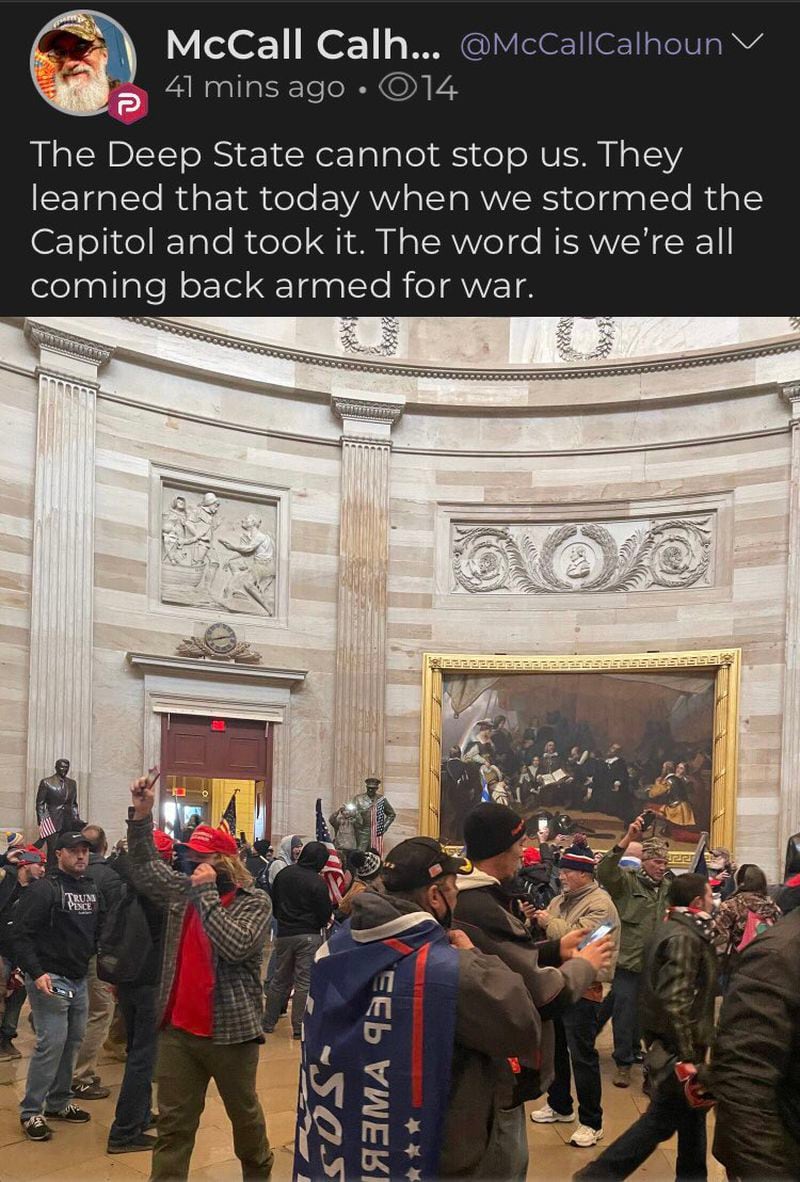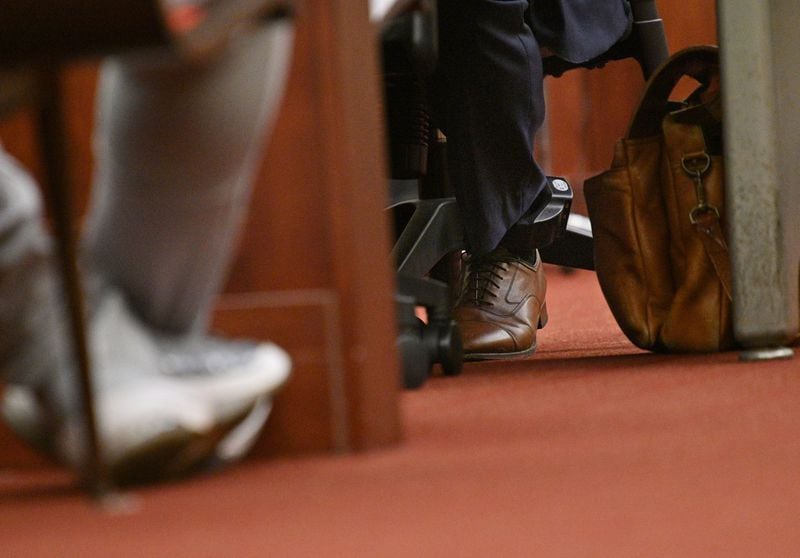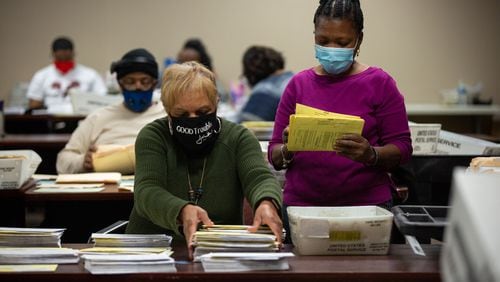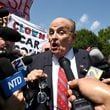AMERICUS — Attorney William McCall Calhoun Jr. questioned potential jurors Monday for his client’s pending murder trial, probing for biases that could affect his chances.
At one point during the proceeding, a court-ordered ankle monitor could be seen poking from beneath the pantleg of Calhoun’s slate-blue suit.
Later, Sumter County Superior Court Judge Jimmie Brown told the jurors not to do any of their own research about the case.
“Don’t Google any of the attorneys,” he said.
Calhoun, 58, is one of the more than 725 people criminally charged in the Jan. 6, 2021 U.S. Capitol riot, although he is believed to be the only practicing criminal defense attorney. He faces five federal charges related to the breaching of the Capitol. The most serious is obstructing an official proceeding, a felony that carries a prison sentence of up to 20 years.
Nevertheless, he has continued to defend clients in this southwest Georgia community. Not every case involves a murder charge. A list of Calhoun’s clients furnished to the U.S. District Court in Washington, D.C., included everything from speeding tickets to aggravated assault and low-level drug possession. His ongoing practice in Americus has been noticed in legal circles across the state.
“For Georgia lawyers, I think it was especially horrifying to hear that one of our number was involved in that assault on the Capitol,” said attorney Lester Tate, a former president of the State Bar of Georgia.
It raises a question for the State Bar of Georgia: Should a lawyer continue to practice in Georgia while he’s a defendant in the biggest legal case in the country?
The State Bar thus far has taken no disciplinary action and doesn’t plan to until Calhoun’s charges are adjudicated.
“The Bar does not govern personal conduct by a lawyer,” said Bar spokeswoman Jennifer Mason. “Mr. Calhoun’s participation in the riots was personal conduct and does not violate the Rules of Professional Conduct unless it constituted a crime.”
Tate said he was “shocked” by the statement. The State Bar certainly gets into the personal lives of would-be lawyers, he said.
“When you go to apply to be a member of the Bar, they do credit checks, all sorts of stuff in your background to make sure that you meet the standards to be a lawyer,” he said.
Credit: HYOSUB SHIN / AJC
Credit: HYOSUB SHIN / AJC
In the Sumter County courtroom, Calhoun — his graying hair pulled back in a ponytail and his long beard finely combed — hardly came across as a fire-eating ideologue or wild-eyed conspiracy theorist. Before the jurors arrived, Judge Brown agreed to Calhoun’s motion that his criminal charges would not be mentioned.
Calhoun’s expression was serious, even stern, but his voice was soft. He spoke slowly and haltingly, introducing himself as an “an attorney in Americus” and speaking to jurors about their “very important civic duty.”
Outside the courthouse during a break, Calhoun seemed like a different man — feisty and defiant over the charges he faces in Washington, D.C., and how he dismissed the federal prosecution’s plea offer out of hand.
“They offered me a felony,” he said. “I know I didn’t commit a felony.”
Calhoun, a University of Georgia law grad, has been a practicing attorney for three decades. According to court records, social media posts and his own comments to the Atlanta Journal-Constitution, Calhoun was among the throng to push deep into the U.S. Capitol, searching for members of Congress and breaking into House Speaker Nancy Pelosi’s office, although he told the AJC in an interview two days after the riot that he did not personally enter any office.
The U.S. Department of Justice has charged him with “corruptly” attempting to obstruct Congress’s certification of the Electoral College vote and four misdemeanors relating to his alleged entry into the Capitol.
He traveled to Washington with a buddy, Verden Andrew Nalley, a 50-year-old construction worker from Buford, with whom Calhoun had attended an earlier “Stop the Steal” rally at the Georgia State Capitol. Nalley pleaded guilty in December to a misdemeanor charge and will be sentenced in March to up to six months in prison and thousands in fines.
Calhoun said he should be offered the same treatment as his co-defendant instead of receiving “the Osama bin Laden treatment.” He said he views his entry into the Capitol as “peaceful protest.”
Credit: U.S. Department of Justice
Credit: U.S. Department of Justice
More than 225 people have been charged with assaulting or resisting police officers in the Capitol riot and 75 are charged with using a deadly weapon or seriously injuring an officer. Calhoun has not been charged with assaulting police, although in a social media post following the riot, he wrote, “We overran multiple police barricades and busted through.”
His alleged role in the Capitol attack came after months of fiery comments he made on Parler, Facebook and Twitter aimed at Democrats, often with promises of deadly violence.
“The Democrats want to crush all dissent,” he said Monday. “I speak my mind. I did before, and I do now.”
Calhoun said he never threatened anyone in his social media posts. But in the months leading up to the Jan. 6 riot, his posts suggested he was prepared for violence. In one post in December on the conservative forum Parler, he referred to New York Rep. Alexandria Ocasio-Cortez as a “dead commie walking.”
In a Twitter post on Oct. 16, 2020, Calhoun warned he had been “getting range time in” with his assault rifle.
Credit: Parler
Credit: Parler
“My AR15 set up will do head shots at 200 meters no problem,” he wrote. “You have no clue what’s coming.”
Two days later, Calhoun tweeted, “We’re on the cusp of violent revolution.” He also posted a photo of then-candidate Joe Biden superimposed over a Chinese flag. “Hang the bastard,” he wrote.
According to court records, the FBI received a tip on Nov. 12, 2020 about Calhoun’s social media posts, including one where he allegedly wrote “we are going to kill every last communist who stands in Trump’s way.”
Calhoun bragged about his role in breaching the Capitol after the riot.
“The first of us who got upstairs kicked in Nancy Pelosi’s office door and pushed down the hall towards her inner sanctum, the mob howling with rage — Crazy Nancy probably would have been torn into little pieces, but she was nowhere to be seen,” he wrote in a Parler post.
Tate said the State Bar’s hands aren’t tied and could move against Calhoun ahead of a criminal verdict.
“The bar could implement disciplinary proceedings to get an interim suspension,” he said.
The Bar’s rules allow for an emergency suspension of a lawyer’s license in cases where they pose an ongoing threat to the public. The rules require the bar to ask the Supreme Court to suspend an attorney if there is “sufficient evidence demonstrating that a lawyer’s conduct poses a substantial threat of harm to his clients or the public,” but what constitutes such a threat isn’t clear.
Credit: HYOSUB SHIN / AJC
Credit: HYOSUB SHIN / AJC
Mason, the State Bar spokeswoman, said the rules refer to “conduct within the practice of law,” rather than what a lawyer does outside of their practice.
It’s a fuzzy line in some cases.
In 2021, the Tennessee Supreme Court suspended the license of a Nashville lawyer for posting advice to a friend on Facebook that she could kill her ex-boyfriend by luring him into her home and later claiming he broke in. Also last year, the South Carolina Supreme Court suspended the license of a lawyer for repeated racist rants on social media prompting dozens of public complaints.
For Calhoun, the State Bar will wait until he has his day in court.
“Our rules require that the lawyer be convicted before we act because, just like any other person accused of a crime, our system grants defendants a presumption of innocence,” Mason said.
That likely will not come for some time. Last month, Calhoun rejected the prosecution’s plea offer and a trial date has not been set.
“I let the court know on day one that we could resolve this,” Calhoun said. But he said he does not intend to agree to a felony conviction — one that would end his legal career.
Our Reporting
AJC Reporter Chris Joyner has been following the Jan. 6 riots since that violent day at the U.S. Capitol. He has written dozens of stories detailing the sprawling investigation that has led to 17 Georgians getting charged in relation to the insurrection. He has profiled some of the defendants to offer readers insight into Georgian’s role in the riots. He will continue to follow this important story.
